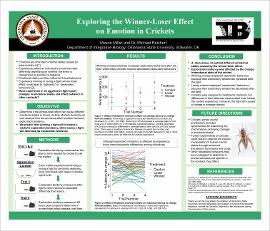| dc.contributor.advisor | Reichert, Michael | |
| dc.contributor.author | Miller, Mason | |
| dc.contributor.other | Gottfried, Clarissa | |
| dc.date.accessioned | 2022-04-13T14:44:27Z | |
| dc.date.available | 2022-04-13T14:44:27Z | |
| dc.date.issued | 2022-04-19 | |
| dc.identifier | oksd_URS_2022_miller | |
| dc.identifier.citation | Miller, M., & Reichert, M. (2022, April 19). Exploring the winner-loser effect on emotion in crickets. Poster session presented at the Oklahoma State University Undergraduate Research Symposium, Stillwater, OK. | |
| dc.identifier.uri | https://hdl.handle.net/11244/335220 | |
| dc.description.abstract | Individual variation in behavioral traits, commonly referred to as 'personality,' is exhibited in numerous animal species, including invertebrates. The specific personality trait of exploration tendency may be affected by positive/optimistic or negative/pessimistic emotional states. Animal contests can induce these emotions, as winning against one's opponent increases 'optimism', while losing causes 'pessimism'; these states can then affect behavior in other contexts. Previous studies demonstrate that house crickets (Acheta domesticus) experience this winner-loser effect in fights, thus we investigated if a cricket's exploratory behavior is influenced by the outcome of its contest. We predicted that after a fight, winners would exhibit increased exploratory behavior due to an optimistic emotional state, while losers would show decreased exploratory behavior due to a pessimistic emotional state. Exploration tendency was measured as an individual's latency to exit a shelter, tested twice for repeatability. Crickets then participated in an aggression contest, with opponents randomly chosen to be either smaller or larger so that focal individuals either won (n=20) or lost (n=17), respectively. Latency was again measured after the contest, as well as 48 hours later to examine the persistence of winner-loser effects on exploration behavior over longer time periods. Latencies for control crickets (n=20) were measured at the same time points, but controls did not engage in a fight. Winning crickets' latency times decreased following the contest, while losing crickets' latency times increased. This suggests that individuals' emotional states were changed by the experience of the fight and affected exploration tendencies. These data on invertebrate emotions have important implications on human health by allowing for future studies on the mechanisms behind mental states. | |
| dc.description.sponsorship | Lew Wentz Foundation | |
| dc.format | application/pdf | |
| dc.language | en_US | |
| dc.publisher | Oklahoma State University | |
| dc.rights | In the Oklahoma State University Library's institutional repository this paper is made available through the open access principles and the terms of agreement/consent between the author(s) and the publisher. The permission policy on the use, reproduction or distribution of the article falls under fair use for educational, scholarship, and research purposes. Contact Digital Resources and Discovery Services at lib-dls@okstate.edu or 405-744-9161 for further information. | |
| dc.title | Exploring the winner-loser effect on emotion in crickets | |
| osu.filename | oksd_URS_2022_miller.pdf | |
| dc.description.department | Integrative Biology | |
| dc.type.genre | Poster | |
| dc.type.material | Text | |
| dc.type.material | Image | |
| dc.subject.keywords | animal behavior | |
| dc.subject.keywords | invertebrates | |
| dc.subject.keywords | emotions | |
